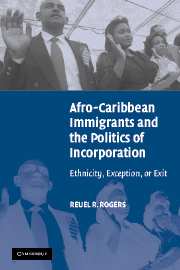Book contents
- Frontmatter
- Contents
- List of Tables
- List of Illustrations
- Acknowledgments
- Strangers at the Gate: Immigrant Political Incorporation in a New Century
- 1 Beyond Black and White: Theories of Political Incorporation
- 2 “Good” Blacks and “Bad” Blacks?
- 3 Letting Sleeping Giants Lie
- 4 Afro-Caribbeans and African Americans: Racially Bound or Ethnically Splintered?
- 5 Afro-Caribbean Sojourners: Home Country Ties and the Hope of Return
- 6 Black Like Who? Afro-Caribbean Immigrants, African Americans, and the Politics of Group Identity
- 7 Black Ethnic Options
- Conclusion: Reconsidering Political Incorporation and Race
- Appendix A Methodology
- Appendix B Interview Schedules
- Bibliography
- Index
1 - Beyond Black and White: Theories of Political Incorporation
Published online by Cambridge University Press: 07 November 2009
- Frontmatter
- Contents
- List of Tables
- List of Illustrations
- Acknowledgments
- Strangers at the Gate: Immigrant Political Incorporation in a New Century
- 1 Beyond Black and White: Theories of Political Incorporation
- 2 “Good” Blacks and “Bad” Blacks?
- 3 Letting Sleeping Giants Lie
- 4 Afro-Caribbeans and African Americans: Racially Bound or Ethnically Splintered?
- 5 Afro-Caribbean Sojourners: Home Country Ties and the Hope of Return
- 6 Black Like Who? Afro-Caribbean Immigrants, African Americans, and the Politics of Group Identity
- 7 Black Ethnic Options
- Conclusion: Reconsidering Political Incorporation and Race
- Appendix A Methodology
- Appendix B Interview Schedules
- Bibliography
- Index
Summary
I am the poor white, fooled and pushed apart,
I am the Negro bearing slavery's scars …
I am the immigrant clutching the hope I seek …
Langston HughesHow are Afro-Caribbeans and the millions of other recent immigrants from Asia and Latin America adapting to the American political system? How is the political incorporation process unfolding for these newcomers in the cities where they have settled? These groups are part of a long historical succession of outsiders who have attempted to become insiders and gain a foothold in American democracy – from European immigrants in the early twentieth century to African Americans only a few decades ago. Although the research on today's newcomers is just emerging, there is an established political science literature on the earlier generations of outsiders, European immigrants and African Americans. This body of research potentially provides a road map for charting how the new wave of newcomers might adapt to American political life.
Before I delve into the experiences of Afro-Caribbean immigrants, I use this chapter to explore this literature and establish the theoretical scaffolding for the study. First, I offer a definition of political incorporation that extends beyond the usual focus on outcomes to consider the dynamics of the process. I then review the details of the dominant models of incorporation – specifically, the pluralist and minority group approaches – to set the stage for the analysis in the following chapters.
- Type
- Chapter
- Information
- Afro-Caribbean Immigrants and the Politics of IncorporationEthnicity, Exception, or Exit, pp. 16 - 42Publisher: Cambridge University PressPrint publication year: 2006



